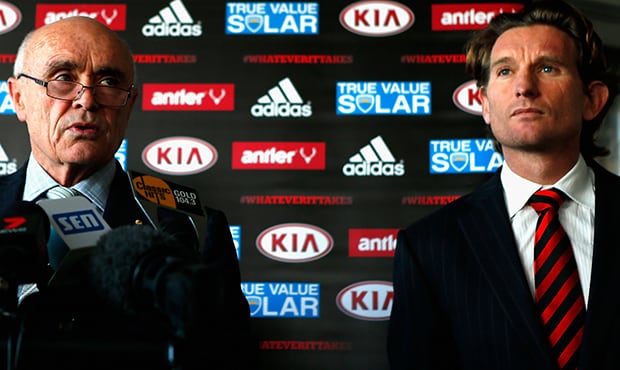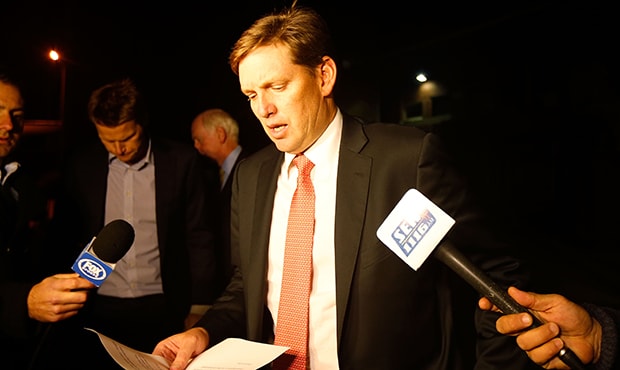EVEN on the morning after the great backdown, which came after the six-month long request that the truth be made public, the spin continued.
James Hird had been "heroic", according to his lawyer. Essendon had been "unfairly dealt with", according to Hird himself. Give us a spell.
And here's the real doozy, again from his lawyer – it was "very likely" Hird would have succeeded in court action against the AFL had he pursued it. Of course he would have.
For nearly seven months, we were told by Hird that he and Essendon were going to be in far better position when the AFL/ASADA investigation had fully played out.
High-end lawyers were employed, at monumental cost, to ensure that be the case.
Click here for full coverage of the Essendon supplement scandal
Hird had the full backing of the person holding the highest position at his football club, too.
Well, he did after his belligerence in wanting to not just take on the AFL, but accuse its two highest-ranked executives, Andrew Demetriou and Gillon McLachlan, of actions that may have been punishable by jail, contributed to forcing out the previous chairman David Evans.
Evans, a man who happened to be a 20-year friend, and like so many others caught up in the reverence of Hird, was a man who had worshipped his every move.
One wonders what broke first in Evans – his heart or his health. And whether it was his realisation that Hird was prepared to put himself ahead of the club and the game that triggered the hurt.
The sanctions accepted on Tuesday night by Hird, the Essendon Football Club, assistant coach Mark Thompson and football operations manager Danny Corcoran, were actually greater than those being thrashed out by Evans, before he quit.
And yet on the morning after the great backdown, which came after months of legal threats to go the journey, Hird was still being positioned in public debate as innocent.
In fact, he had done "absolutely nothing wrong", according to Julian Burnside QC.
Whatever.

Would love to know exactly how much football money was lost to lawyers in this drama. Would love to know exactly if and how much Essendon Football Club money was used by Hird for his legal pursuits. Remember, that money, if it was used by Hird, is effectively members' money. And it has been wasted just like the 2013 season.
At least Hird himself used the "sorry" word on several occasions when he finally rolled up at AFL Headquarters late on Tuesday.
But as he now ponders the disgrace, the hurt and the unknown attached to a 12-month AFL suspension, he needs to ask many questions. Mostly of himself, starting with why he played the dangerous legal game all the way through to this week.
Club chairman Paul Little needs to ask himself why he allowed Hird – even encouraged him – to head down that path.
Little's press conference last week, when he said the AFL was "reprehensible" and actually dared to talk on behalf of the football public to state it had lost confidence in the AFL, was staggering in its delusion.
Let's pump that chest a few more times, right after Hird had pumped his.
In the end, and given Essendon's decision to roll over on Tuesday night, the whole legal threat line was nothing but a deliberate ploy to divert attention from the actual issue: the embarrassingly amateurish handling of the drugs program inflicted on players from late 2011 and into 2012.
So, are we meant to just forget that stance, which was so botched that it actually united the 17 rival clubs on one issue like never before, Paul Little?
The man himself needs to address why he held the game of AFL to ransom for so long, and if he doesn't, Essendon members should.
When it was all signed off with the AFL late Tuesday night, Little had arrived at a set of sanctions that were harsher than those being worked on by Evans.
And he arrived at that outcome when he finally and so belatedly concluded that his football club was never going to win this issue.
Evans' role in all of this still needs proper analysis, but at least he was aware that serious sanctions were guaranteed, and didn't take the club down its frothing-at-the-mouth course.

The AFL is far from faultless in this embarrassing saga. It needs to thoroughly review its football operations department, and meticulously revisit the late 2011 meeting with Hird where peptides were discussed.
It should consider handing down its own sanctions against those who knew of that meeting and yet then failed to police the Bombers' subsequent actions.
Adrian Anderson's time as football operations manager saw a lot of chest-pumping and public belittling of people who dared to wager a few dollars on certain contests, yet not much when it came to trying to get to the bottom of other, equally serious issues.
Such as the very obvious preparedness of some officials and players to push the boundaries of performance enhancement.
Remember, in 2011 Anderson admitted that more than 20 players were being profiled by drug testers. Senior doping officials from rival sports maintain that athletes are not, as a rule, profiled without reason.
The AFL needs to fully get its head around the fact that the men who play its game, and those who coach and guide them, will push to the absolute limit the boundaries upon which they operate. Just like athletes all round the world.
No more of the well entrenched, naive starting-point view that everyone is clean.
It also needs to realise that a negotiated outcome is not always the best way to deal with a scandal.
It needs, just like Essendon, to ask the toughest questions of itself. And to commit to acting on the findings, as it attempts to move on from an issue at least partially of its own making which has forever tainted the game it controls.


